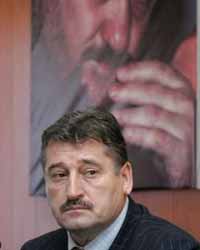|
Kremlin Party Sweeps Chechen Vote, Observers Skeptical
 |
|
A woman walks past a wall covered with election posters in Chechnya's capital Grozny. (Reuters)
|
GROZNY,
November 28, 2005 (IslamOnline.net & News Agencies) -
Kremlin-backed candidates swept parliamentary elections in Chechnya,
officials announced Monday, November 28, as European observers cast
doubts over the vote.
Results
from 171 of the 430 polling centers showed the pro-Kremlin United
Russia party taking about 60 percent of the vote, reported Agence
France-Presse (AFP).
The
communists were in second place with around 12 percent of the vote
followed by the liberal Union of Right Forces who scored around 10.5
percent, according to the preliminary results announced by Ismail
Baikhanov, chairman of the province's election commission.
Other
Russian political parties, including the liberal Yabloko party led by
reformer economist Grigory Yavlinsky and the ultranationalist Rodina
party, picked up under five percent apiece.
Authorities
said turnout was above 66 percent of the approximately 600,000
registered voters.
The
parliamentary election was the first in Chechnya since Russian troops
in 1999 launched their second war in a decade against the republic.
Hailed
Russian
President Vladimir Putin on Monday hailed the election as proof that
the situation in Chechnya was getting back to normal after more than a
decade of war life.
"The
elections formally cap the legal process of reestablishing a
constitutional regime in this republic," he said in comments to
government ministers broadcast on state television.
"We
understand perfectly well that much work lies ahead of us."
The
Kremlin-backed president of Chechnya, Alu Alkhanov, echoed that line,
telling reporters Monday at a news conference in the demolished
Chechen capital, Grozny, that "yesterday's election is clear
proof of the strengthened democratic process in Chechnya."
He
attributed the election sweep by the United Russia party to the fact
that "they were here from the beginning of our tragedy."
The
European Commission expressed hope on Monday that the lack of violence
during elections in Chechnya over the weekend would signal a return to
peace talks.
"We
welcome the fact that the elections took place without violence and we
hope it will be a step toward a peaceful political process in the
future," said Emma Udwin, spokeswoman on external affairs at the
EU's executive body.
"That's
what we want to see," she added.
"There
hasn't been much information on the way this election was
conducted," Udwin said, adding that neither the EU nor Europe's
OSCE security organization had sent monitors to the conflict-torn
Caucasus region.
Sideshow
 |
|
Kremlin-backed Alu Alkhanov said the election "is clear proof of the strengthened democratic process in Chechnya." (Reuters)
|
A
German organization blasted the election as fruitless, warning it
would deepen the divide in Chechnya.
In
a 35-page report, cited by Aljazeera.net Web site, the organization
said the continued Russian policies in Chechnya and other Caucasus
republics feed terrorism.
It
cited a deteriorating human rights condition in Chechnya over the past
four months, especially during the election campaign.
The
organization also slammed a proposed bill in the Russian parliament to
restrict the working of Russian human rights groups, especially in
reporting about the situation in Chechnya.
Meanwhile,
the head of a European fact-finding mission who witnessed the poll
said he was "ambivalent" about the election itself and said
that the "real power" in the province that lies with Ramzan
Kadyrov, Chechnya's deputy prime minister and son of Alkhanov's
predecessor, was illegitimate.
Chechen
voters "hope that the parliament will improve the
situation," said Andreas Gross, rapporteur on Chechnya for the
Parliamentary Assembly of the Council of Europe, citing in particular
widespread security fears among the local population.
But
"real power... is based on a legitimacy that is not
democratic," Gross added, referring to Kadyrov, a local
power-broker who heads up a force of several thousand pro-Moscow
fighters.
The
eight-member mission from PACE and the CoE's Congress of Local and
Regional Authorities visited the Chechen capital Grozny, the town of
Achkhoi-Martan and met with Kadyrov at his powerbase in Tsentoroi.
"We
face a very weak democratic power and a very strong real power and
this real power is out of control," Gross said, adding that he
met with two Chechen women whose family members had apparently been
kidnapped by Kadyrov's militia.
Speaking
at a military base in Grozny, Gross said separatists should be
included in the political process and called for roundtable
discussions.
"It's
better to fight with political programs than with weapons," said
another member of the delegation, Polish parliamentarian Tadeusz
Iwinski.
Iwinski
compared the parliamentary elections to those held in 1997 after a
first 1994-1996 war in Chechnya ended in Russian defeat.
"It
was a time when people were very patriotic... They had a lot of
enthusiasm that they could create something new. But now it's like a
marriage after 25 years, no-one believes in love anymore,"
Iwinski said.
Chechen
resistance leader Abd Al-Halim Sadulayev appeared in a videotape
obtained by the Qatar-based Al-Jazeera news channel on Sunday,
dismissing the polls as a "farce."
The
small mountainous Caucasus republic has been ravaged by conflict since
1994, with just three years of relative peace after the first Russian
invasion of the region ended in August 1996 and the second began in
October 1999.
At
least 100,000 Chechen civilians and 10,000 Russian troops are
estimated to have been killed in both invasions, but human rights
groups have said the real numbers could be much higher.
International
human rights watchdogs said in a joint
statement that rape, torture and extrajudicial executions by
Russian troops have become everyday occurrences in Chechnya.
|